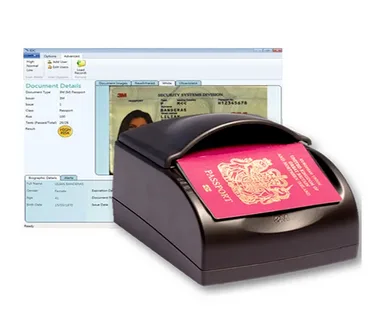In an increasingly interconnected world, the demand for efficient and secure travel has never been higher. As borders open up and international travel resumes, the aviation and hospitality industries seek innovative solutions to enhance the traveler experience while ensuring safety and compliance. Passport scanners emerge as a pivotal technology in this evolving landscape, simplifying the verification process and expediting travel activities at numerous touchpoints.
What is a Passport Scanner?
A passport scanner is a specialized device designed to read and process the information contained in a passport. Utilizing optical character recognition (OCR) technology, these scanners capture the details found on a passport’s machine-readable zone (MRZ) and other key areas. This includes essential data such as the traveler’s name, passport number, nationality, date of birth, and expiration date.
Typically, the passport scanning process unfolds in three main steps:
- Image Capture: The traveler presents their passport to the scanner, which captures a high-resolution image of the document.
- Data Extraction: The OCR technology interprets the information from the scanned image, converting it into a digital format that can be easily processed.
- Verification: The extracted data is then used for immediate verification purposes, ensuring that it matches the provided information against relevant criteria.
Applications of Passport Scanners
Passport scanners have found widespread applications across various sectors, revolutionizing the way we approach identity verification in travel:
- Airports and Airlines: One of the most prevalent uses of passport scanners is at airports. Self-service check-in kiosks equipped with passport scanners allow passengers to check in quickly, reducing long queues and wait times at airport counters. Additionally, security checkpoints utilize passport scanners to ensure that travelers match their documentation with flight details efficiently.
- Border Control and Immigration: Customs and border protection agencies have adopted passport scanning to streamline the immigration process. By deploying automated kiosks, travelers can scan their passports, allowing for faster processing at border control and reducing congestion during peak travel hours.
- Rental Services: Many car rental companies integrate passport scanning into their verification processes. By scanning passports, these companies can quickly confirm the identities of renters, ensuring compliance with regulations and enhancing the security of vehicle rentals.
- Hotels and Accommodations: The hospitality industry has also embraced passport scanners to improve check-in procedures. Hotels can request guests to scan their passports upon arrival, enabling seamless identity verification that accelerates the check-in process while maintaining compliance with local regulations.
Benefits of Passport Scanners
The implementation of passport scanners offers numerous advantages to both travelers and service providers:
- Efficiency and Speed: By automating the data extraction process, passport scanners significantly reduce the time required for identity verification. This fast-tracks the travel experience, minimizing bottlenecks at airports and other checkpoints.
- Accuracy: Passport scanners, employing OCR technology, are capable of accurately reading and processing data with minimal errors. This reliability reduces issues that can arise from manual data entry, such as typos or misinterpretations.
- Enhanced Security: With instant verification capabilities, passport scanners help identify discrepancies and potential fraudulent activities efficiently. This added layer of security not only protects travelers but also assists authorities in maintaining safe travel environments.
- User-Friendliness: Modern passport scanners are designed to be intuitive and user-friendly, making it easy for travelers to interact with the technology. This facilitates a smoother experience for individuals who may be less familiar with complex systems.
The Future of Passport Scanners
As the travel landscape continues to evolve, the future of passport scanning technology is bright. Improvements in scanning devices, including more sophisticated OCR algorithms, promise to enhance the speed and accuracy of data extraction even further. As travel demand grows, the integration of passport scanning technology into streamlined processes will be essential in providing travelers with a hassle-free experience.
In conclusion, passport scanners represent a transformative approach to identity verification in the travel industry. By enhancing efficiency, security, and user experience, they play a crucial role in modernizing how we navigate international borders and engage with travel services. As technology continues to advance, the role of passport scanners will undoubtedly expand, contributing to a more seamless and secure travel experience for all.



